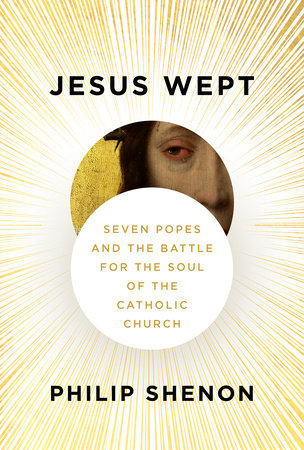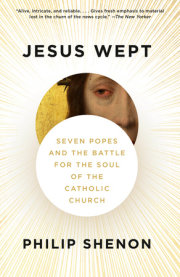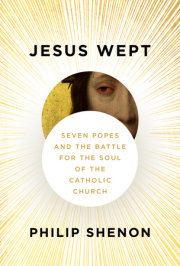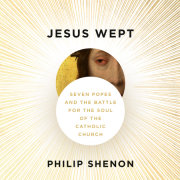1
-
The Silent Pope
Pius XII was the first pope to be a global celebrity in his lifetime. Thanks to newsreels and glossy photo magazines in the 1930s and 1940s, his face was recognizable to almost all Catholics on earth. His large, dark eyes, usually photographed behind rimless glasses, suggested an abiding devotion to God and absolute tranquility. He liked to pose for photos with his pampered pet goldfinch, Gretel, on his shoulder, or sometimes cradling a baby lamb trucked in from a nearby farm, as if to imply his presence could calm all God’s creatures. He was celebrated nowhere more highly than in Rome. He was born there in 1876 as Eugenio Maria Giuseppe Giovanni Pacelli to a family of seminoble Vatican bureaucrats. After World War II, Romans hailed him for having singlehandedly saved the city from destruction; he repeatedly pleaded with Franklin Roosevelt and Winston Churchill to spare the Eternal City from Allied bombers.
Pius was especially beloved in Germany, where he was known as der deutsche Papst—the German pope—and the affection was mutual. He came to love the country after spending a dozen years there as a Vatican diplomat, beginning at the end of World War I. In its efficiency and orderliness, he came to prefer Germany to his homeland. Throughout his papacy, his household staff was made up almost entirely of German nuns led by a tough-minded Bavarian, Sister Pascalina Lehnert, who were ordered to address him only in German. The pope’s personal confessor was a kindly German Jesuit, Father Augustin Bea, a renowned biblical scholar who would go on to become a powerful adviser to Pius’s successors.
Pius was, at the time of his death, the most prolific writing pope of all time. He was author of forty-one of the supreme teaching documents known as encyclicals. They set down church policy on the most profound issues of the twentieth century—ranging from the rise of Marxism, which he saw as an existential threat, to artificial contraception; he joined with predecessors in describing birth control as a violation of God’s natural laws. Other encyclicals offered surprisingly commonplace advice, including what movies Catholics should see (they must avoid films that “contain something contrary to Catholic belief”) and what musical instruments their children should play (violins and other bowed instruments were best, because they “express the joyous and sad sentiments of the soul”). His stature seemed only to grow in the first years after World War II. As the Iron Curtain descended across Eastern Europe, he was saluted in Western capitals for his willingness to confront communism. Shortly after his death in 1958, however, his legacy was called into question. The controversy centered on his failure to speak out against the Holocaust. Church archives released after his death proved he received concrete evidence throughout the war of the genocide, yet chose to remain almost completely silent about it in public.
His legacy was also battered by testimony from former deputies, who told ugly, embarrassing stories about how erratic he had been. Throughout the 1950s, they reported, the long-ailing Pius had limited his circle of advisers to a handful of aides and family members. He was especially dependent on Pascalina. In written accounts, his former deputies gave a shocking appraisal of his failings. Cardinal Domenico Tardini, who managed foreign policy, described the pope as paralyzed by self-doubt. “He wasn’t a fighter,” Tardini wrote in his memoirs. “He was handicapped by caution.” Church archives showed that other powerful bishops were appalled by the pope’s conduct during the war. Cardinal Eugène Tisserant of France, a senior Curia bureaucrat later named dean of the College of Cardinals, wrote to a colleague in the early months of the war that Pius, by remaining silent about Nazi war crimes, pursued a policy “of selfish convenience and not much else.” The cardinal suggested future generations would—and should—judge Pius harshly.
No one would prove more indiscreet or better informed than Pascalina. “The mistakes of His Holiness brought tears to my eyes,” she told an interviewer after his death. Although the public knew almost nothing about her during his papacy, she had been as influential as almost any cardinal. Her principal critic was Tisserant, who often warned the pope of a potential scandal over her influence. “It’s a disgrace for a woman to be given such authority in the church,” the cardinal told a colleague. She completed her memoirs in 1959, but the church declined to publish them for more than two decades, apparently fearing her account would create an uproar by revealing such an intimate, if nonsexual, relationship between a pope and a woman.
Pascalina controlled the pope’s schedule, determining who could see him and when. She often canceled long-arranged meetings with Curia officials if a popular entertainer or politician visiting Rome requested a last-minute reception. She recalled how they were both thrilled to rearrange his schedule to grant an audience to the actor Clark Gable in the 1940s. She was by the pope’s side at those meetings, holding a glass container of disinfectant that she used to wipe his hands after every encounter with a worshipper who kissed his ring. The two met in 1917, when then-Archbishop Pacelli stayed in a retreat house in Switzerland affiliated with the Sisters of the Holy Cross, an order of German-speaking nuns that Pascalina joined at the age of fifteen. Pascalina, by then a strikingly pretty twenty-two-year-old, had been assigned to tend to the forty-one-year-old Pacelli. She said she knew early on their relationship would inspire gossip, although no evidence ever emerged to show she was anything other than a treasured friend and adviser. “It wasn’t that His Holiness had no needs of the heart,” she said later, revealing that Pius, as a young man, had come close to abandoning his plans for the priesthood when he proposed to an Italian girl named Lucia. “If Lucia had said yes, he never would have become pope.”
She claimed credit for significant acts of his papacy, including his decision in 1944 to serve as his own secretary of state. The move incensed many in the Curia who felt Pius already centralized too much power in his own hands. “He was the kind of pope who was accustomed to doing everything possible by himself,” said Cardinal Richard Cushing of Boston, who was appointed that city’s archbishop by Pius but never felt close to him. In later years, Pius insisted he did not need anyone’s advice. “I want people to do what I say, not to help me think,” he barked to Tardini. That helped explain why he blocked the promotion of a new generation of cardinals. After 1953, Pius failed to appoint a single one.
The Germans on his staff were treated with respect by the pope, but he earned a reputation for humiliating everyone else, especially fellow Italians. Apart from Pascalina, Pius’s closest aides were a pair of Italian priests who held the largely honorary title of monsignor: Tardini, named a cardinal after Pius’s death, and Giovanni Montini, the future Pope Paul VI. Pascalina thought Pius was nasty to them both, especially the meek Montini. “I pitied him so,” she said. “He was a thin little person and always had such a frightened look on his face.” On some days, she recalled, Pius was “vocally cruel” to everyone. He was the first pope to use a telephone regularly, and he was notorious for angry calls to subordinates, who were expected to fall to their knees when they recognized his voice on the line.
Pascalina believed Pius’s fondness for all things German was responsible for his worst decisions, and that he was dangerously naïve in his dealings with the Nazis in the 1920s and 1930s. His writings from the time suggest he believed Hitler could be a useful ally in containing communism, which he saw as a far greater threat than fascism. To a journalist, Pascalina recalled an astonishing scene in which Hitler paid a visit to then-Archbishop Pacelli in the nuncio’s residence in Munich. During the meeting, Pacelli handed Hitler an envelope filled with cash to support political efforts to combat Marxism. “Go quell the devil’s work,” Pacelli told the rising demagogue, according to Pascalina’s account. “Help spread the love of Almighty God.” Hitler, who was born a Catholic but would turn on the church, replied: “Yes, for the love of Almighty God.”
In 1929, Pacelli returned to Rome and was made a cardinal by Pius XI. The next year, the pope also named him secretary of state. In that post, Pacelli drafted the 1933 pact with Nazi Germany that guaranteed special privileges to the Vatican, including the right to appoint local bishops without the Nazis’ interference, in exchange for the church’s promise to remove itself from German politics. That meant withdrawing the church’s support for the key opposition party, known as the Zentrum. The pact, modeled on one signed four years earlier with Mussolini, required German bishops to swear a loyalty oath to the Third Reich and compelled Catholic parishes to open up baptism and marriage records. That allowed the Nazis to identify Jewish converts to Catholicism.
Throughout the war, Pascalina said, she repeatedly urged the pope to condemn the Nazis, especially as the first horrifying intelligence reports arrived in 1940 about Hitler’s plans for the Holocaust. She later remembered telling him: “If you, as Holy Father, were to reveal the extermination of Jews, people all over the world would believe you.” But Pius refused, saying he believed a protest would do nothing to stop the slaughter and might bring retaliation against Catholics. He knew how his silence might damage his reputation. “This Holy Father may go down in history as being anti-Semitic,” he told Pascalina, according to her account. But that was better, he said, “than for the Holy See to wear its virtue on its sleeve so the Nazis can claim more victims.” He did not deny that his love for the German people also explained his silence. When in 1943 the semiofficial Vatican newspaper, L’Osservatore Romano, interviewed him and suggested he denounce Hitler, Pius replied, “You must not forget, dear friend, that there are millions of Catholics in the German army. Would you like to place them in the middle of a conflict of conscience?”
The war came to the pope’s doorstep in 1943, when Mussolini was overthrown and the Nazis invaded Italy. Although Mussolini imposed so-called racial laws that placed draconian limits on the rights of Jews, they had not been targeted for outright extermination, as in Germany. So when Nazi troops marched onto the streets of Rome in September 1943, the threat was obvious and terrifying to the city’s nearly twelve thousand Jews, most of them living in the riverside neighborhood known as the Ghetto di Roma. Pascalina panicked at the idea that Rome’s Jews, whose community had existed there for more than two thousand years, would be rounded up within hours, and she pressed the pope again: “If you cannot bring yourself to denounce Hitler, then the least the papacy can do is to lend full support to the Jewish people” who lived in the city that the Catholic Church called its home. To her relief, the pope agreed. Ultimately, about ten thousand Jews were saved, many sheltered inside Vatican City. The effort came too late for more than thirteen hundred others, who were ordered into a tree-shaded square bordering Rome’s largest synagogue, placed in sealed trucks, and shipped to death camps, most to Auschwitz in Poland.
Pius never expressed regret over his silence about the Holocaust. To the alarm of Truman administration officials directing the postwar occupation of Germany, the pope ordered Vatican diplomats to press for clemency for German Catholics accused of war crimes, including military officers who supervised the camps. In stark contrast to his neutrality in World War II, he became a fierce Cold Warrior. In 1946 the French ambassador to the Vatican reported the pope was “obsessive” in his hatred for communists, especially as Marxist politicians threatened to come to power in Italy. Three years later, Pius issued a decree excommunicating all Catholics who identified themselves as communists, a step he never took against German Catholics who were members of the Nazi Party. In speeches throughout the late 1940s, he expressed outrage about governments in Hungary, Poland, and other Soviet-bloc nations that jailed Catholic clerics. In 1949, he apparently saw no irony in a speech in which he denounced communist leaders in Eastern Europe over their persecution of Catholics and then turned to his audience to ask: “How can the pope be silent?”
Copyright © 2025 by Philip Shenon. All rights reserved. No part of this excerpt may be reproduced or reprinted without permission in writing from the publisher.









